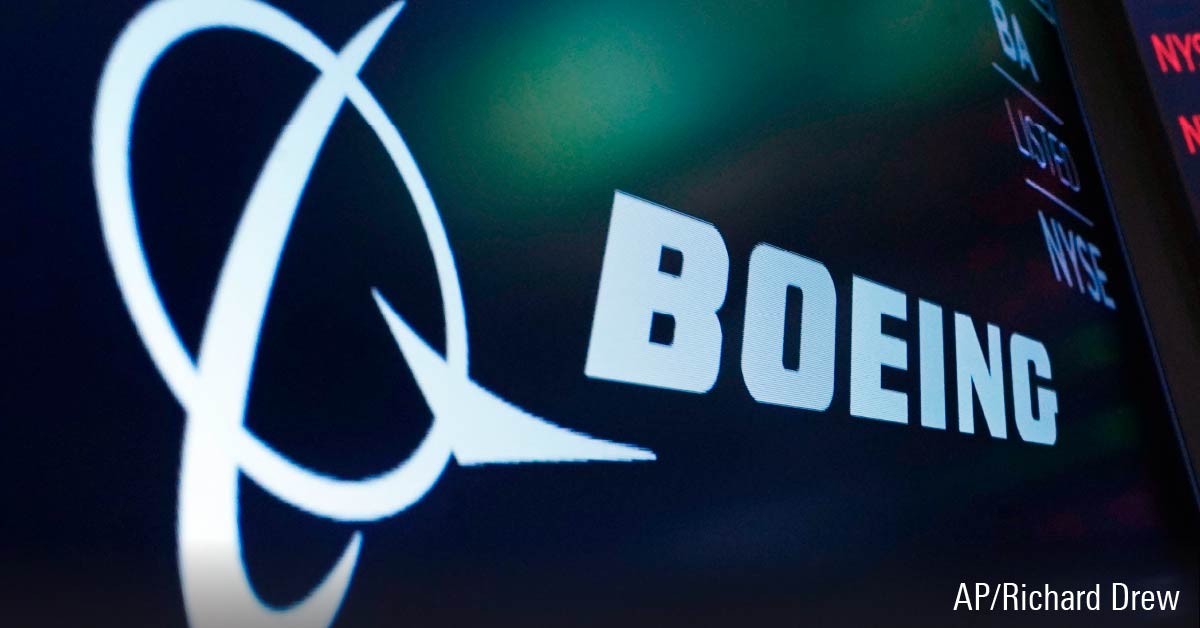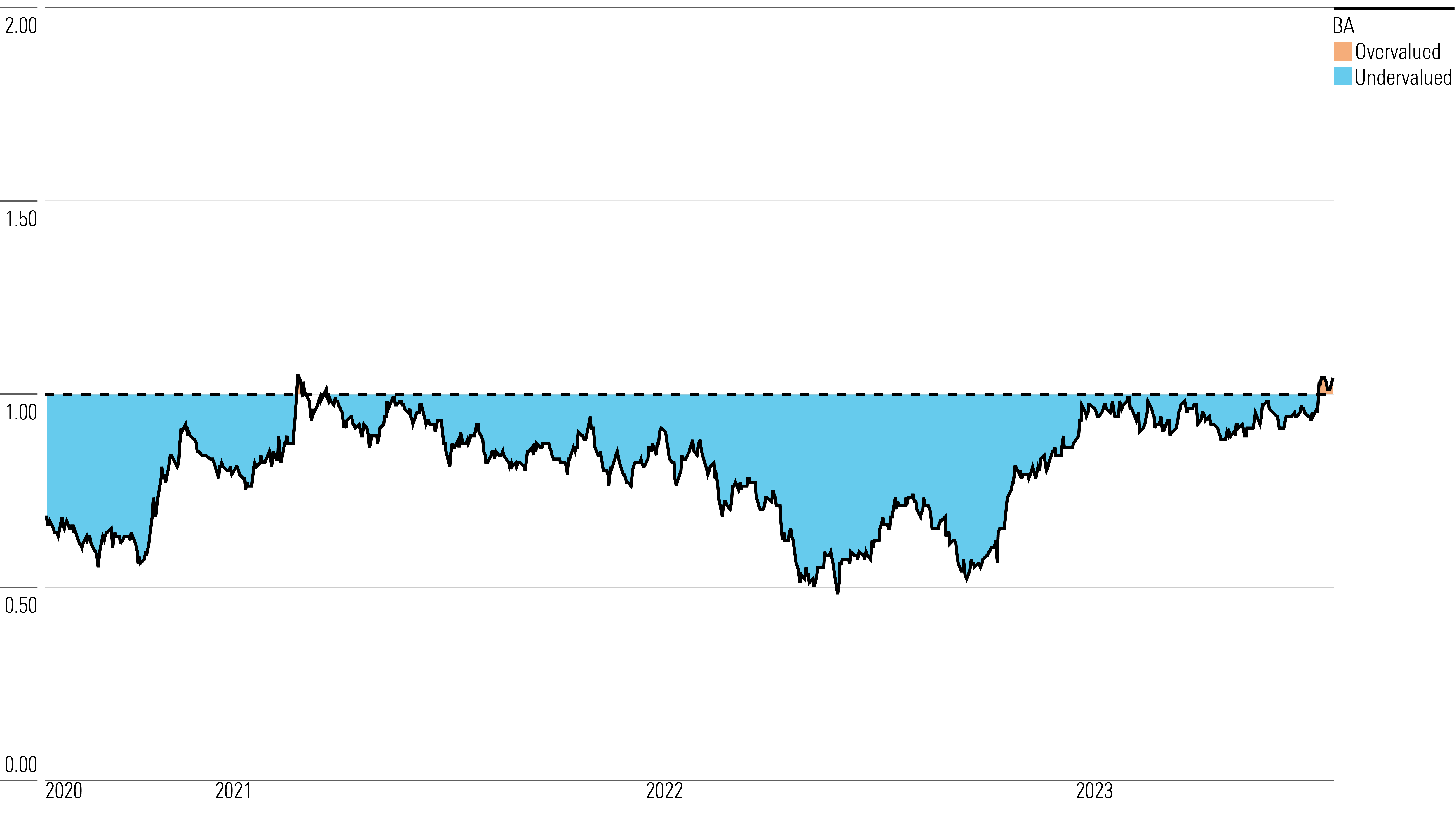After Earnings, Is Boeing Stock a Buy, a Sell, or Fairly Valued?
With growing revenue, a huge rise in demand for jet airliners, and successful boosts in production, here’s what we think of Boeing stock.

Boeing BA released its second-quarter earnings report on Wednesday, July 26, 2023, during trading hours. Here’s Morningstar’s take on what to think of Boeing’s earnings and stock.
Key Morningstar Metrics for Boeing
- Fair Value Estimate: $230.00
- Morningstar Rating: 3 stars
- Morningstar Economic Moat Rating: Wide
- Morningstar Uncertainty Rating: High
What We Thought of Boeing’s Q2 Earnings
Revenue growth: Boeing’s second-quarter earnings confirmed that the firm saw revenue continue to grow in commercial jets—up to 41% since June 2022.
Demand for jet airliners: The overall thesis is that there is a huge 20-year demand for Boeing and Airbus’ main product: jet airliners. (Defense, satellites, and helicopters pale in importance to the company’s overall revenue and profits.) Second-quarter results showed Boeing building its ability to meet that demand by ramping up production rates for 737s and 787s, anticipating five per month at the end of this year, in line with the thesis.
Boosted production: We tweaked our estimate of aircraft slightly higher over the next two years, based on reports that airlines are prioritizing timing and access to the successful re-ramping of the production schedule over hard negotiation on pricing.
Boeing Stock Price
Fair Value Estimate for Boeing
With its 3-star rating, we believe Boeing’s stock is fairly valued compared with our long-term fair value estimate.
We value Boeing at $230 per share, which represents 24 times our 2024 free cash flow and 2 times our 2024 sales estimates. We think the company’s enormous special charges and fleet groundings are behind it, though we forecast a couple of years of hard slogging as it clears up supply chain issues hampering the pace of production. Our valuation includes healthy long-term global demand for Boeing’s products and successful scaling up of deliveries, as well as eventual margins on its bread-and-butter 737 and 787 models.
The COVID-19 crisis shocked the aviation industry and essentially halved global revenue passenger kilometers, or RPK, in 2020. Beyond the pandemic and lingering manufacturing headaches, we assume robust RPK growth. We believe a replacement cycle will take place in most airlines, and that the vast majority of fleet growth will be from narrow-body aircraft as an emerging-market middle class demands more short-haul and point-to-point medium-haul travel.
Read more about Boeing’s fair value estimate.
Boeing Historical Price/Fair Value Ratios

Economic Moat Rating
We think Boeing merits a wide moat rating because it benefits from durable intangible assets and switching costs. In the commercial aircraft manufacturing segment, we believe the technical complexity of manufacturing and the extensive regulatory barriers to entering the market constitute wide-moat-caliber intangible assets. Boeing and Airbus benefit from these barriers to entry, operating a duopoly in the global large-frame jet aircraft market. We expect virtually all global revenue associated with air travel growth will continue to flow through their top lines. What’s more, we estimate that airline demand for their products will remain high enough for long enough for both firms to generate economic profits for decades.
Although we think Boeing has taken some competitive hits in the commercial aerospace duopoly, the commercial airplane market is large enough and so difficult to break into that it supports two wide-moat aircraft manufacturers. We think Boeing’s defense business is more exposed to operational risk than its peers due to its higher exposure to fixed-price contracts, but we think the firm is turning a corner operationally.
Boeing benefits from intangible assets stemming from the technical complexity of its products, as well as switching costs arising from the time and effort the military faces to switch suppliers and a lack of viable alternative suppliers. We think Boeing Global Services possesses intangible assets stemming from its proprietary access to aftermarket part designs, since the Federal Aviation Administration and other regulators require that spare parts be identical to originals. There are also switching costs stemming from a lack of alternative suppliers for such parts.
Read more about Boeing’s moat rating.
Risk and Uncertainty
We think Boeing’s biggest risks are macro risks that limit demand and operational risks that constrain supply—both of which the company has weathered over the last three years. We think Boeing deserves a High Morningstar Uncertainty Rating, but note that it is still working through much higher supply risks than Airbus as it revives 737 MAX and 787 production and deliveries.
On the demand side, the pandemic dramatically reduced air travel and aircraft deliveries. Trade group IATA reported that passenger demand declined by nearly two-thirds in 2020. While we anticipate travel to eventually return to pre-pandemic levels, this recovery is likely to be patchy and may face renewed disruption. Additionally, the future of business travel is somewhat more uncertain than that of leisure travel. Because high-yielding business travelers are some of the most profitable customers for airlines, any lack of resurgence here may dampen new aircraft demand.
Finally, the 737 MAX is still grounded in China, a major aviation market. Although Boeing has completed a test flight for Chinese regulators, the MAX’s recertification could be caught in the crosshairs of United States-China trade relations. Further, assuming recertification of the MAX in China in due course, we suspect it may be easier (if not simply more expedient) for local airlines to substitute marginal orders of 737s for Comac C919s while maintaining or growing their share of orders for Airbus narrow bodies.
Read more about Boeing’s risk and uncertainty.
BA Bulls Say
- Boeing has a large backlog that covers several years of production for the most popular aircraft, which gives us confidence in aggregate demand for aerospace products.
- Boeing is well-positioned to benefit from emerging-market growth in RPK and a robust developed-market replacement cycle over the next two decades.
- We expect commercial airframe manufacturing will remain a duopoly in most of the world for the foreseeable future. We think customers will not have any meaningful options other than continuing to rely on incumbent aircraft suppliers.
BA Bears Say
- We see substantial operational risk in Boeing’s plans to simultaneously ramp production of the 737 MAX and sell aircraft in storage as the aviation crisis and supply chain issues unwind.
- In the long term, changed consumer behavior (especially among business travelers) could be unfavorable for aviation.
- As recent history has proved, aircraft development is notoriously susceptible to development delays, hiccups, and cost overruns.
This article was compiled by Monit Khandwala.
The author or authors do not own shares in any securities mentioned in this article. Find out about Morningstar’s editorial policies.

/s3.amazonaws.com/arc-authors/morningstar/4c0ebe77-db24-4647-aac9-f4c13027ec2f.jpg)
/cloudfront-us-east-1.images.arcpublishing.com/morningstar/ECVXZPYGAJEWHOXQMUK6RKDJOM.jpg)
/cloudfront-us-east-1.images.arcpublishing.com/morningstar/KOTZFI3SBBGOVJJVPI7NWAPW4E.jpg)
/cloudfront-us-east-1.images.arcpublishing.com/morningstar/V33GR4AWKNF5XACS3HZ356QWCM.jpg)
:quality(80)/s3.amazonaws.com/arc-authors/morningstar/4c0ebe77-db24-4647-aac9-f4c13027ec2f.jpg)